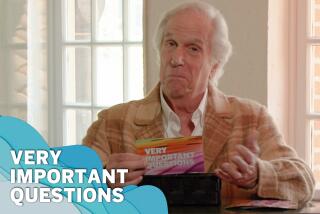Coping With Your Child’s Life Choices
The book “Mother, I have Something to Tell You” begins like this:
“We are mothers who speak to you here. We know that birth is violent, that blood must flow and flesh tear and hard bones bend to bring new life into the world. . . .”
Author Margaret Taylor Smith deals with what many mothers would agree can be a much more painful event--the birth of a child as a person--a person who may make life choices that frighten, sadden or appall parents.
Smith set out to learn how mothers cope when a teen-aged or young-adult child makes a shocking or heartbreaking choice. She interviewed mothers who had learned to live with tragedy such as a child’s suicide or drug addiction, and also mothers whose children opted to pursue life styles that deeply disturbed their parents. One mother faced the long ordeal of an anorexic daughter, another the extraordinary experience of learning that her gifted, petite 13-year-old daughter was a transsexual.
The interviews, done in the Detroit area where Smith lives, are in the archive of the Murray Research Center at Radcliff College. The book, published by Doubleday, was written by journalist Jo Brans.
Smith, 61, has raised four children and come through one of the less-destructive bombshells that children can drop. Her son had married and divorced shortly after finishing college, then went to live with, and eventually married, a black woman (the Smiths are white) who was older and had children. (While all the women she interviewed are white, Smith said groups of minority women where she has spoken identified with her views of problems and themes in mother-child relations.)
Nontraditional marriage choices illustrate the kinds of issues Smith wished to explore. The mothers she interviewed were chosen from her own generation and class, women who came of age in the ‘50s and were dedicated to making a career of being perfect mothers.
The children, in turn, grew up in the ‘60s and ‘70s in a period of social upheaval and changing values. “I think what one has to keep in mind,” Smith said, “is that throughout our history there have been disruptive times. The ‘60s and ‘70s were particularly so. There was a schism in the country. The middle class was being challenged.”
Many, but not all, of the women Smith interviewed had a great deal of help and support in the parenting crisis from their husbands, but she chose to focus on the mothers and the unique relationship between mothers and their children.
These mothers also were affected by the times. They devotedly taught values like tolerance and independent thinking. But, Smith said, virtually all were no less dismayed when the child raised to think for himself went out and did so in unexpected ways.
It is not only children who grow up. So do mothers. “There are no cosmic answers for good parenting,” Smith said. “This is very hard for parents to understand. The women who coped were willing to change and grow themselves.”
Whether the mother faced the tragedy of a dead child or a child in prison, or the less devastating choices children make, Smith said she found that there was a common pattern in the way mothers coped:
--Shock. For different mothers this is marked by denial, confusion, anger with the child, and an overwhelming sense that she, the mother, is somehow responsible and guilty.
--Attention. In this stage, the mother begins to try to understand the child--the real child behind the ideal child she had created in her mind. She tries to interpret the child’s behavior to others.
--Action. Turning from feelings to action, the mother tries to learn about the problem, seeks information and help from experts.
--Detachment. Having done her best to understand the child and help the child, she realizes the limits of her responsibility. She frees the child from her expectations.
--Autonomy. The mother turns back to the only life for which she is fully responsible: her own. This is frequently a period of growth in marriage and in activities.
--Connection. The bonds of love between mother and child are asserted, this time between two independent people.
“The women who coped,” Smith said, “were women who were willing to change and grow themselves.”
More to Read
Sign up for our Book Club newsletter
Get the latest news, events and more from the Los Angeles Times Book Club, and help us get L.A. reading and talking.
You may occasionally receive promotional content from the Los Angeles Times.






